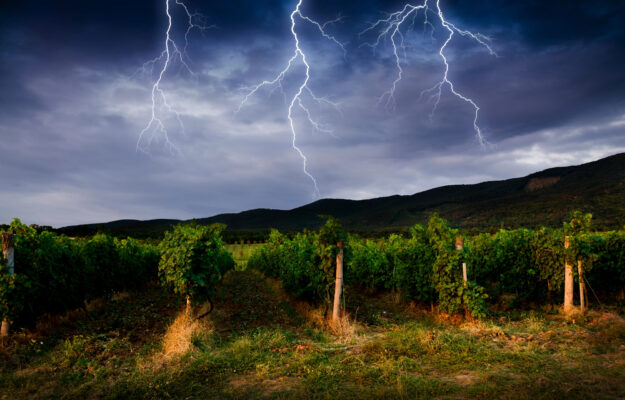Working in the vineyard is a more and more complex and unpredictable activity, and the reason is simple: climate change. It is one of the pitfalls that now appear quite regularly, and the consequent effects definitely put a real strain on the work done on a daily basis. It is no coincidence, then, that wineries are running for cover to protect themselves from a complicated scenario, even though, according to the numbers, insurance policies in Italy are decreasing. As a matter of fact, out of more than 241.000 Italian wine companies, only 27.000 (11%) are insured against weather and climate risk. However, in terms of surface area, it represents the more significant 30% of the total hectares of vineyards (approximately 673.000 hectares). More than a third of the subsidized agricultural insurance market specific to vegetable cultivation is concentrated in the sector, counting policies that cumulate 2.3 billion euros in value, equal to over 50% of the PLV (gross salable production) of the sector. ISMEA, the Italian institute of services for the agro-food market, illustrated the numbers at Vinitaly2024 in Verona, during the conference, “Active and passive risk management measures in the wine grape supply chain”. The numbers confirmed the importance of the wine sector in terms of adhering to risk management tools. And, at the same time, they highlighted the need to safeguard the absolutely important assets and working capital for the Italian agri-food sector. The production turnover is just under 14 billion euros (more than 10% of agri-food turnover), and almost 8 billion euros in exports, while Italian wineries move, outside National borders, the highest volumes on a global level.
Regarding the territory, in 2023 the number of insured wineries in the northern Regions increased +2%, which however, did not compensate for the decrease registered in the rest of Italy, which was, respectively, - 9% in the Center and -18% in the South. Therefore, the National figure registered - 4,9% decrease compared to 2022. The North covers just under 80% of the values insured in Italy, and the Veneto Region is the leader(40.4%). Veneto is the number one wine-growing Region on the National level, followed by Friuli Venezia Giulia (11.5%), while the Central Regions hold 10% share, and Tuscany accounts for the lion’s share (7.8%). In the South, including the Islands (10.7%), the leading Region is Puglia, totaling 6.7% of the total insured values. The conference further highlighted the virtuous circle that is triggered by correct risk prevention and management strategies, which also supports access to credit, and the natural propensity of banks to enhance companies in the evaluation metrics of customers to be financed, who make investments in this sense.
“In addition to the evident territorial imbalance, there are also problems linked to wine companies needing to deal with the lack of attention from insurance companies regarding phytosanitary risks, due to the fact that there is an absence of history of claims needed for correct pricing”, Camillo Zaccarini Bonelli, Manager at ISMEA, stated, further specifying that “this is why companies, essentially in Northern Italy, which have focused on a mix of risk management tools, have been able to benefit from better protection. Where possible, they have combined a policy against climate risks, phytosanitary coverage with membership, facilitated, thanks to EU and National contributions, for instance, from a mutual fund. Especially so, considering that the 2023 harvest in Italy fell to its lowest level in 76 years, creating grave yield losses due to the consequences of downy mildew and hailstorms”. Livio Proietti, president of ISMEA, said, “we must encourage, using the CAP resources, a closer collaboration between insurance and mutual insurance coverage, and active defense tools, such as anti-hail nets, drones and sensors, which also limit the costs for taking out policies”, and continued, saying, “ISMEA manages the database on risks in agriculture, and guarantees constant support to the institutions on risk management issues, providing the necessary data and information to exchange knowledge and to prevent risks for companies, which are exposed today, more than in the past, to the effects of climate change”.
Copyright © 2000/2026
Contatti: info@winenews.it
Seguici anche su Twitter: @WineNewsIt
Seguici anche su Facebook: @winenewsit
Questo articolo è tratto dall'archivio di WineNews - Tutti i diritti riservati - Copyright © 2000/2026







































































































































































































